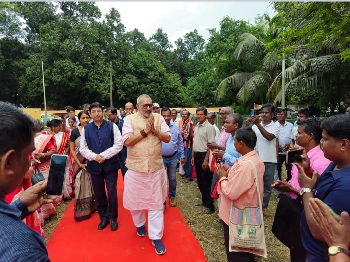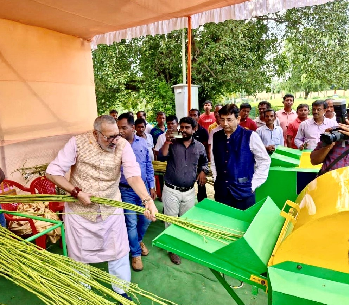5 September 2025, Barrackpore
Union Minister of Textiles, Shri Giriraj Singh, chaired a comprehensive review meeting with stakeholders of the jute and allied fibre industry at the ICAR-Central Research Institute for Jute and Allied Fibres, Barrackpore. The session highlighted key innovations, policy directions, and collaborative initiatives aimed at modernizing the sector and strengthening India’s leadership in sustainable textiles.
The Minister inaugurated two landmark technologies the Jute Ribbonner Machine and the Bast Belter Decorticator. The Jute Ribbonner Machine enables farmers to efficiently separate straw from jute stalks without sticking, thereby reducing labour, time, and production costs. This innovation is expected to enhance farm productivity, improve rural incomes, and boost global competitiveness in jute cultivation. These mechanization efforts mark a step forward in bringing precision and modernity to post-harvest jute handling.

Addressing the gathering, Shri Giriraj Singh stressed the importance of accelerating innovation in farming systems, particularly for emerging bast fibres. He underlined the need for developing alternate planting materials t
hrough tissue culture, introducing improved varieties, and strengthening farmer training and awareness. These measures, he said, are critical to realizing India’s vision of becoming a global leader in the “farm-to-fashion” value chain with affordable and sustainable textiles.
During his visit, the Minister also toured the Bast Mega Plantation and Sisal–Tuberose Plantation at ICAR-CRIJAF. Developed under the New Age Fibre initiative, these integrated models link multiple crops and farming cycles, promoting sustainability while generating eco-friendly raw materials for the textile industry. Serving as “living laboratories,” the plantations also provide hands-on training for farmers, encouraging income diversification and preparing them to meet future market demands.
Dr. Gouranga Kar, Director of ICAR-CRIJAF, presented the institute’s initiatives in expanding new-age fibre cultivation and accompanied the Minister and delegates during the field visits.

A significant outcome of the meeting was the signing of five Memorandums of Understanding (MoUs) with textile industry stakeholders. These MoUs are designed to promote new-age natural fibres such as flax, ramie, and sisal eco-friendly alternatives to plastics and synthetics. The agreements will facilitate technology transfer, research collaborations, and commercialization, paving the way for employment generation and industry-wide adoption of sustainable fibres.
The event witnessed the participation of around 150 industry partners and stakeholders, including farmers.
(Source: ICAR-Central Research Institute for Jute and Allied Fibres, Barrackpore)







फेसबुक पर लाइक करें
यूट्यूब पर सदस्यता लें
X पर फॉलो करना X
इंस्टाग्राम पर लाइक करें